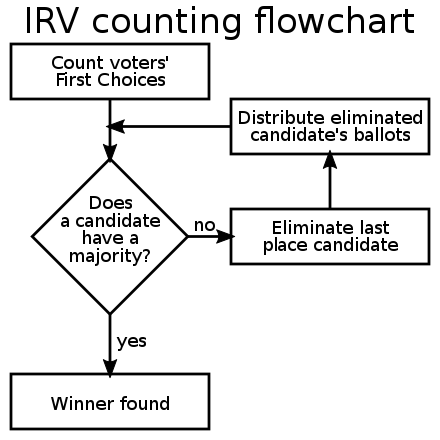Chris Powell: Time for ranked-choice voting; the bear facts
Typical counting process of a single seat ranked choice voting election. RCV/IRV = ranked-choice voting / instant run-off voting are synonymous.
MANCHESTER, Conn.
While it's good that Donald Trump now has some official competition for the Republican nomination for president in 2024 -- former South Carolina Gov. Nikki Haley, who was Trump's ambassador to the United Nations -- the problem is likely to be that Trump will have too much competition for the nomination, as he did when he first ran in 2016.
Back then 16 candidates of some standing ran against Trump for the Republican nomination, and they split the anti-Trump vote in the party so badly that he had a surprisingly easy path through the primaries to the Republican National Convention.
Trump retains much support among Republicans, though he is probably the weakest candidate they could choose to challenge President Biden or any other Democrat. Recent polls have suggested that Florida Gov. Ron DeSantis, who is acting like a potential presidential candidate, might defeat Trump in one-on-one Republican primaries but that Trump would win if he faced more than one challenger.
Despite the incompetence of the Biden administration, there is little chance that Trump could ever carry Connecticut. Maybe no Republican candidate for president could. But surely there are potential Republican candidates for president who might do better in Connecticut than Trump and thus harm other Republican candidates here less and help restore political competition to the state.
The prospect of Trump's renomination is an urgent reason for Connecticut to adopt ranked-choice voting, which encourages candidates to try to win by becoming more acceptable to majorities instead of by carving out the biggest and most extreme minority.
xxx
MUST MISTAKES BE FOREVER?: In a newspaper letter the other day defending the monopoly enjoyed by Connecticut's liquor stores on sale of wine, former Enfield state Rep. William Kiner inadvertently showed not only what is wrong with the state's liquor law but also what long has been wrong with state politics generally.
Liquor-store operators, Kiner wrote, "purchased their stores with the knowledge that they alone could sell wine." So, he continued, for state government to let supermarkets sell wine would be "changing the rules in the middle of the game when people's livelihoods are at stake."
That is, mistakes in policy must be preserved forever, no matter how unfair and contrary to the public interest -- especially if an influential special interest draws its livelihood from the mistake. Even the basic rules of a market economy, like free competition, must be suspended if they threaten someone's profitability -- the public interest be damned. That's the Kiner Rule.
But preventing supermarkets from selling wine isn't the only anti-competitive aspect of Connecticut law on alcoholic beverages. State law also establishes a system of minimum pricing for those beverages, a system that inflates prices, ensuring the profitability of beverage distributors and retailers.
If policy is to make alcohol expensive for health reasons, state government should receive the extra revenue as a tax. Instead in Connecticut the extra revenue from the law inflating prices goes to the distributors and retailers themselves. It's a racket that, according to Kiner, must never end.
Of course state law does not guarantee such privileges for any other business. All other businesses in Connecticut are always subject to changes in state law that may and often do diminish their profitability.
If, as many liquor store operators now admit, they can't compete in a free market with lower prices, they should leave the business to people who can.
xxx
ONLY HUNTING MIGHT WORK: Another lobby at the state Capitol, the bear lobby, argues that Connecticut should continue to prohibit hunting of the animals because their infiltration of the state is caused by people failing to secure food and garbage outside.
But if bear food was really so plentiful outside, bears would not increasingly be breaking into Connecticut homes in search of something to eat. No, the bear population has been increasing in the state mainly because hunting them was outlawed long ago.
Yes, getting people to secure their garbage might sometimes induce bears to move along faster. But the state will never eliminate people's negligence, and the bears are already here and causing more trouble. They won't be leaving voluntarily.
Chris Powell is a columnist for the Journal Inquirer in Manchester. (CPowell@JournalInquirer.com)
